Starting out in casting might feel like juggling flaming torches, but it’s an adventure full of creativity and teamwork. First, get a reliable camera or smartphone for auditions, because capturing clear videos is essential. Don’t forget a tripod or your future Oscar winners might end up sideways! Dive deep into the script to understand every quirky character, and chat with the director to get the creative juices flowing. Break the ice with casting calls that detail the roles and show off your project’s personality. Engage with drama schools and local theater scenes to find hidden gems, and you’ll soon uncover the treasures of casting.
Important Highlights
- Begin by thoroughly researching the script and understanding the characters and themes.
- Use a high-quality camera, proper lighting, and a quiet space for professional audition recordings.
- Craft clear and engaging casting calls with all the necessary details to attract suitable talent.
- Build a casting network by connecting with local drama schools, theaters, and online acting forums.
- Collaborate with the director to align casting decisions with the project’s creative vision.
Understanding the Casting Role
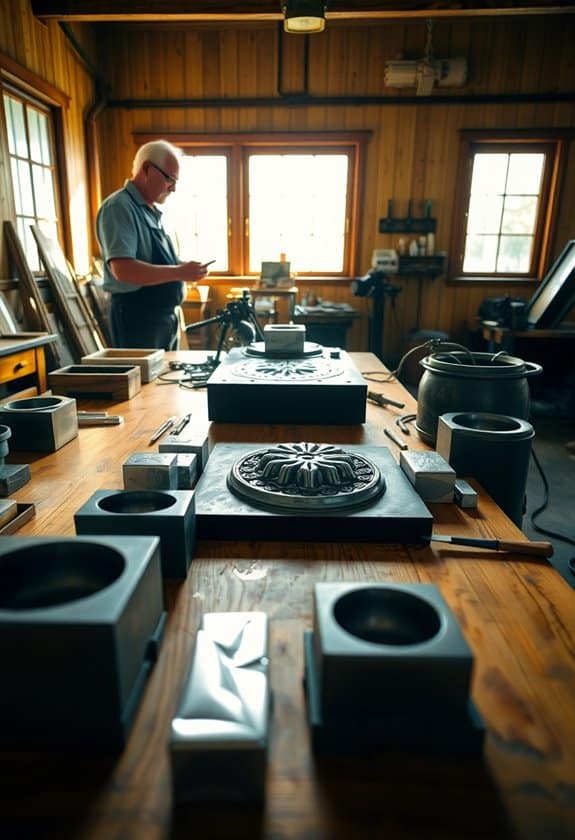
Casting is the backbone of any successful production, whether it’s for film, theater, or television.
You’ve probably seen auditions in movies, where actors line up and nervously hope for that big break. But as someone interested in casting, your role is pivotal in ensuring everyone feels safe and valued.
It’s like being a matchmaker, pairing the right actor with the right role. Imagine being a detective, looking for clues in each audition to find that perfect fit.
Remember, casting isn’t just about talent; it’s about creating a safe and supportive environment for everyone. Your choices can make a story come alive and, yes, it’s a lot of responsibility, but also incredibly rewarding.
Essential Tools and Equipment

When you commence on the journey of casting, having the right tools and equipment is vital to streamline the process and secure success.
You wouldn’t plunge into a pool without confirming it’s safe, right? Similarly, casting requires certain essentials to keep everything running smoothly.
First, invest in a reliable camera or smartphone with a good video recording capability. Consider opting for a camera with higher resolutions to ensure your auditions capture the best detail.
Lighting is your best friend; it guarantees no one looks like a shadowy figure from a spooky story.
A tripod’s important too, unless you want your video to look like an earthquake hit!
Don’t forget a quiet space, free from noisy distractions. Trust me, a barking dog can turn a perfect audition into a comedy sketch.
With these tools, you’re on your way to casting success!
Researching the Project

Before you plunge into casting, understanding the project inside out is essential.
Envision this: you’re casting for a school play, and you’ve no idea about the story! That’d be like jumping into a pool without checking the water.
Start by reading the script thoroughly. Get to know the characters, their personalities, and their quirks. It’s like making new friends—except they live in your imagination.
Research the themes and setting; it’s vital for safety and success. You wouldn’t want to cast a comedy actor in a serious role, right?
If it’s a film, watch similar movies for inspiration. Talk to the director; their vision is your guiding light.
Trust me, this groundwork keeps surprises away, making casting smoother and safer!
Building a Casting Network
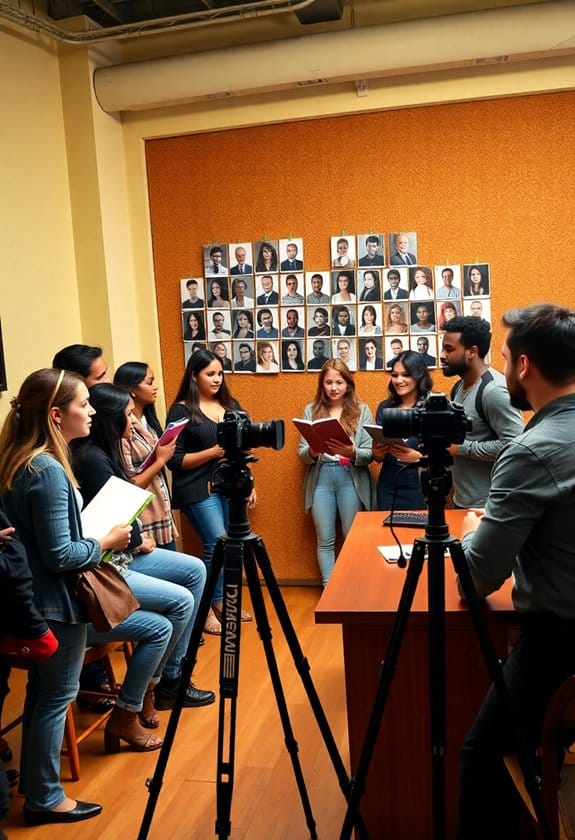
Once you’ve got a solid understanding of your project, it’s time to expand your horizons and build a casting network.
Start by connecting with local drama schools and community theaters. They’re treasure troves of untapped talent, often enthusiastic for opportunities. Attend school plays or community performances—it’s like scouting, but with popcorn!
Joining online forums and social media groups focused on acting lets you meet passionate actors who might be the perfect fit for your project.
Don’t hesitate to ask industry friends for recommendations or introductions. Word of mouth is powerful and offers a layer of trust.
Crafting the Perfect Casting Call

Creating the perfect casting call is essential to attract the right talent for your project, so make sure it’s clear and engaging.
When I started casting, my first call was a bit like a treasure map—exciting but confusing. Keep yours simple and safe, outlining all the key details like the role’s age, gender, and skills.
Don’t forget to include shooting dates and locations, ensuring everyone feels secure about the process. A little humor can go a long way in making your call inviting, but be careful not to overdo it.
And remember, your passion for filmmaking should shine through! Share your vision with enthusiasm, and you’ll find actors who are just as excited to bring your project to life.
Organizing Auditions
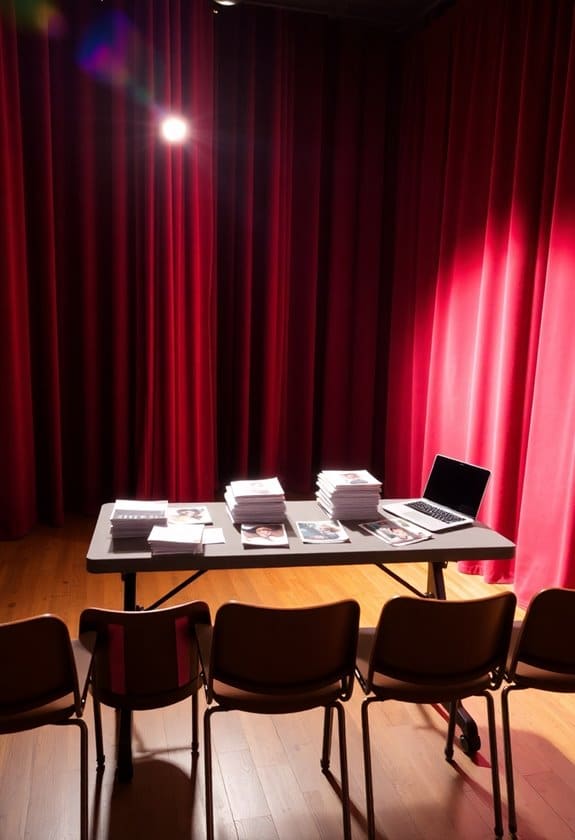
Organizing auditions can be an exhilarating step in the casting process, as this is where your project starts to come to life.
You’ll want to create a safe and welcoming environment for everyone involved. Choose a venue that’s easy to find and has good lighting; nobody wants to trip over cables or get lost!
Scheduling is key, so make a timeline that allows for breaks and keeps things running smoothly. I remember my first time organizing auditions; I was so nervous, but keeping everything structured helped me stay calm.
Be prepared with forms, pens, and water—actors appreciate the thoughtfulness. A bit of humor can lighten the mood, making everyone feel more comfortable and open to giving their best performance.
Evaluating Talent Effectively
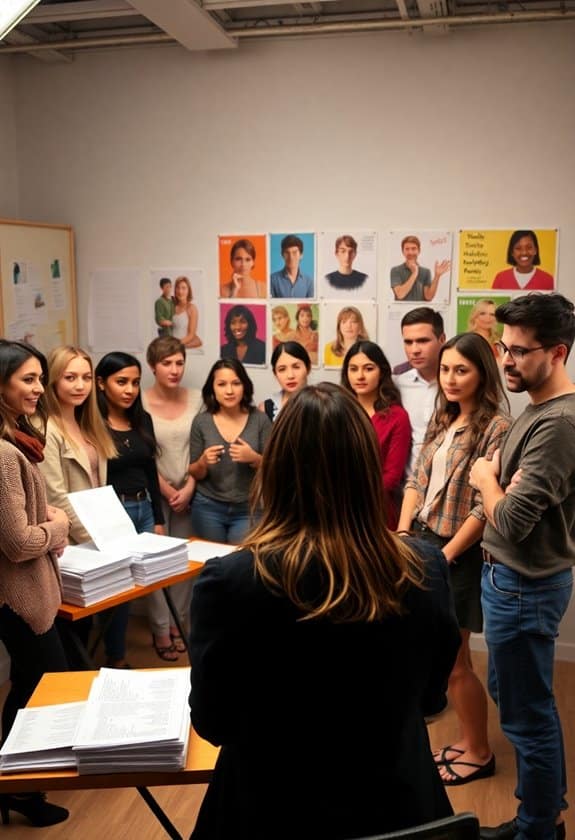
Evaluating talent effectively is a crucial part of the casting process, and a few well-chosen strategies can make all the difference.
It’s like finding the perfect puzzle piece that fits just right. You want to guarantee everyone feels safe and comfortable during auditions, so keep the atmosphere welcoming.
Look beyond the lines and notice how they bring a character to life. Here are some tips to guide you:
- Observe facial expressions: They reveal emotions and depth.
- Listen for vocal variety: It adds layers to their performance.
- Watch body language: It speaks volumes about their character.
- Trust your instincts: Sometimes, you just know when it clicks.
Communicating With Directors
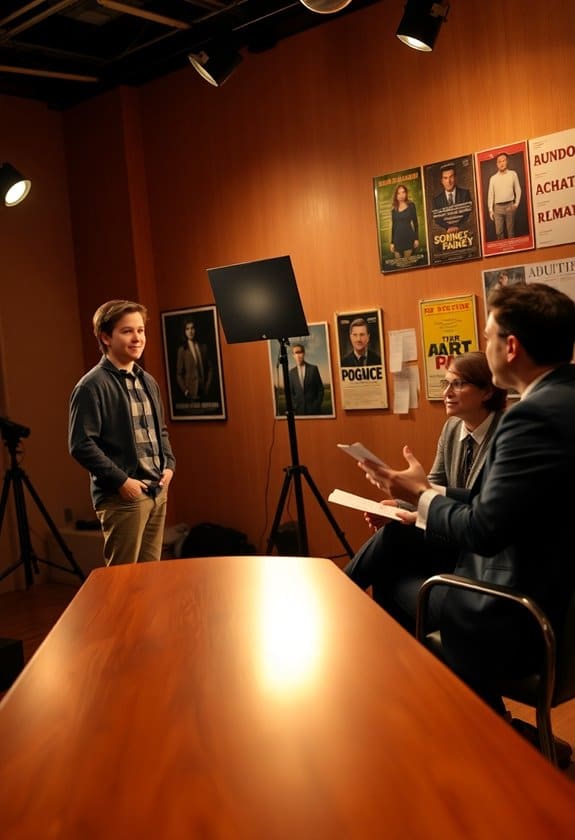
Once you’ve honed your skills in evaluating talent, the next step is building effective communication with directors. This can seem a bit intimidating at first, but don’t worry, it’s all about creating a safe, open space for collaboration.
Imagine you’re on a team, and everyone wants the same goal—a fantastic production. Start by listening carefully to the director’s vision. Ask clarifying questions, showing that you truly care about getting it right.
Share your insights respectfully, and remember, it’s okay to have different opinions. When I first started, I was nervous, too. But by staying open and friendly, I learned directors appreciate honest, thoughtful input.
Keep a positive attitude, and soon, you’ll find you’re a trusted partner in the creative process!
Navigating Contracts and Agreements

Understanding contracts and agreements is an essential skill for any aspiring casting director. You need to navigate these documents carefully to make certain everyone’s on the same page.
It might seem intimidating, but with a little practice, you’ll become a pro. Look out for the following key elements:
- Responsibilities: Clearly define what’s expected from both sides.
- Payment Terms: Make certain payment amounts and schedules are outlined.
- Duration and Exclusivity: Know how long the agreement lasts and if it limits other projects.
- Confidentiality Clauses: Protect sensitive information.
Continuous Learning and Improvement
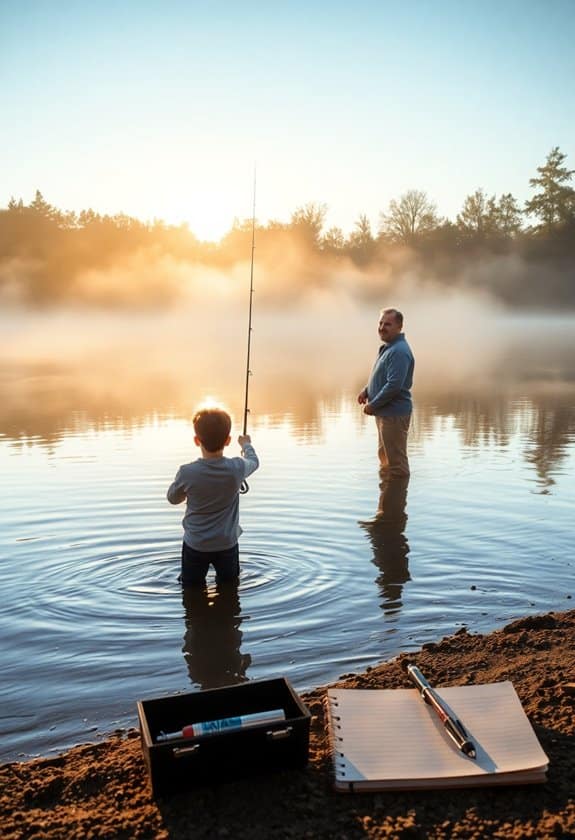
In the ever-evolving field of casting, continuous learning and improvement keep you ahead of the curve. You’ve got to stay updated on the latest trends and techniques, which not only enhance your skills but also guarantee safety in all your projects.
Remember that workshops and online courses are your best friends. I once took a class on digital casting methods—who knew technology could make things smoother?
Don’t shy away from feedback, folks. Listening to constructive criticism helps you grow and adapt.
And hey, don’t forget to network! Sharing experiences with others can open doors to new opportunities and insights. Think of it like a treasure hunt—each connection brings you closer to mastering your craft.
Keep learning, because that’s the real magic!
Frequently Asked Questions
How Do I Handle Last-Minute Casting Changes or Cancellations?
When last-minute casting changes or cancellations happen, stay calm and think on your feet.
It’s like when your favorite ice cream shop runs out of your top pick—you’ve got to choose another flavor!
Keep a list of potential backups, so you’re prepared.
Communicate clearly with your team and actors, ensuring everyone’s on the same page.
Embrace flexibility, because in filmmaking, surprises are part of the adventure.
What Strategies Can Help Manage Stress During the Casting Process?
Imagine casting as a garden, where each actor is a unique flower. Managing stress is like nurturing this garden.
First, breathe deeply—like watering the soil—keeping calm roots you. Make lists, your trusty gardening tools, to stay organized. Lean on others for support, like a gardener’s apprentice.
Remember, mistakes are just weeds; they’re part of growth. Celebrate small wins, like blooms, to keep spirits high.
You’ve got this gardening adventure!
How Can I Ensure Diversity and Inclusion in My Casting Choices?
To guarantee diversity and inclusion in your casting choices, start by broadening your search.
Look beyond your usual circles and think about the stories you want to tell.
Don’t just settle for what’s easy; challenge yourself to see potential in unexpected places.
Consider diverse backgrounds, and remember representation matters!
Once, I found an amazing actor at a community event, proving that talent can surprise you when you least expect it.
What Are the Best Practices for Maintaining Confidentiality With Sensitive Casting Information?
Keeping casting information confidential is essential, especially since you don’t want any spoilers leaking out!
Always use password-protected documents and share them only on a need-to-know basis.
When discussing roles, choose private settings—no whispering secrets in crowded cafeterias!
Also, remind your team about the importance of secrecy.
I once almost leaked a plot twist during a casual chat, which taught me to always stay vigilant and protect the magic of filmmaking.
How Do I Manage Conflicts Between Cast Members During Production?
Managing conflicts between cast members is essential for a smooth production. You should start by listening carefully to both sides, like a detective solving a mystery.
Encourage everyone to express their feelings, just like you’d want for yourself. Use humor to lighten the mood if possible, because laughter is the best glue.
Remind them of the shared goal: making an awesome production. Your guidance can turn tension into teamwork, creating a positive atmosphere.




